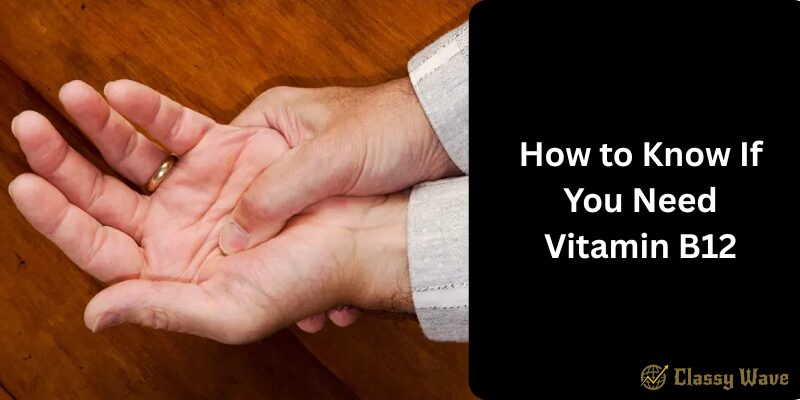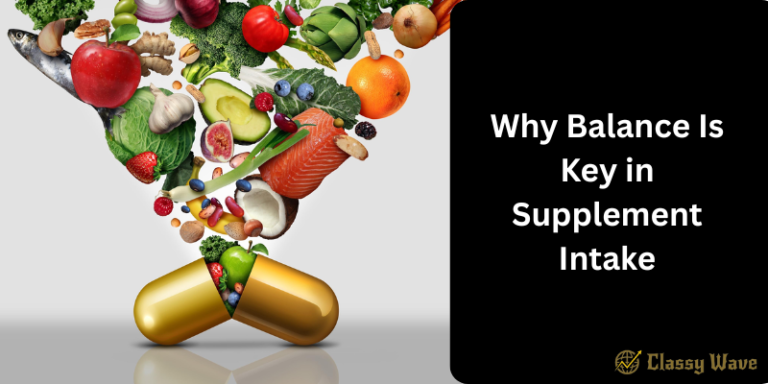How to Know If You Need Vitamin B12 | Classy Wave
Feeling tired all the time, struggling to focus, or experiencing tingling sensations in your hands and feet? These could be signs that your body is running low on vitamin B12 — one of the most essential nutrients for energy, brain function, and overall health. But how do you really know if you need vitamin B12? Let’s explore the symptoms, causes, and ways to check and restore your B12 levels.
What Is Vitamin B12 and Why Is It Important?
Vitamin B12, also known as cobalamin, is a water-soluble vitamin that plays a vital role in your body’s production of red blood cells, DNA synthesis, and the proper functioning of the nervous system. Without enough of it, your body struggles to deliver oxygen to your organs and maintain healthy nerve communication — leading to fatigue, weakness, and other health issues.
Common Signs You Might Be Deficient in Vitamin B12
Vitamin B12 deficiency can develop slowly, so the symptoms may not be obvious at first. Here are some of the most common warning signs:
1. Constant Fatigue and Weakness
If you’re getting enough sleep but still feel exhausted all the time, low B12 could be the reason. This vitamin helps your body produce red blood cells that carry oxygen — without it, your energy levels drop.
2. Pale or Yellowish Skin
A lack of vitamin B12 can cause a condition called megaloblastic anemia, which leads to pale or slightly yellow skin due to reduced red blood cell production.
3. Tingling or Numbness in Hands and Feet
Vitamin B12 supports nerve health. When levels are low, you may experience “pins and needles” sensations, numbness, or tingling in your limbs — a sign your nerves are being affected.
4. Mood Changes and Memory Issues
Low B12 has been linked to mood swings, depression, and memory problems because it affects serotonin production and brain function. If you feel unusually anxious or forgetful, it might be worth checking your B12.
5. Dizziness and Shortness of Breath
A B12 deficiency can reduce oxygen flow in the blood, making you feel dizzy, lightheaded, or short of breath — especially during physical activity.
6. Mouth and Tongue Problems
Some people experience a swollen, red tongue, mouth ulcers, or a burning sensation — all possible indicators of a vitamin B12 deficiency.
7. Vision Problems
Severe B12 deficiency can damage the optic nerve, leading to blurred or disturbed vision.
Who Is Most at Risk of Vitamin B12 Deficiency?
Certain groups of people are more likely to have low B12 levels, including:
- Vegans and vegetarians: Vitamin B12 is mostly found in animal products like meat, eggs, and dairy.
- Older adults: As we age, the body produces less stomach acid, which is needed to absorb B12.
- People with digestive issues: Conditions like celiac disease, Crohn’s disease, or IBS can interfere with B12 absorption.
- Those taking certain medications: Long-term use of antacids or diabetes medication (like metformin) can lower B12 absorption.
- Individuals with poor diets: Low intake of protein-rich or fortified foods can cause a gradual deficiency.
How to Test for Vitamin B12 Deficiency
If you suspect you might be low in B12, a simple blood test can confirm it. Your doctor may also check for methylmalonic acid (MMA) or homocysteine levels, which rise when B12 levels are low.
Don’t self-diagnose — get tested to understand your exact levels before starting any supplements.
Best Sources of Vitamin B12
If your test shows low B12, you can restore it through diet or supplements. Here are some of the best natural sources:
- Animal sources: Beef, liver, fish (salmon, tuna, sardines), eggs, and dairy products
- Fortified foods: Breakfast cereals, plant-based milk (soy, almond, oat), and nutritional yeast
- Supplements: Vitamin B12 tablets, injections, or sprays — especially important for vegans or people with absorption issues
How Much Vitamin B12 Do You Need Daily?
The recommended daily intake (RDI) varies by age and health condition, but on average:
- Adults: 2.4 micrograms (mcg) per day
- Pregnant women: 2.6 mcg per day
- Breastfeeding women: 2.8 mcg per day
Always follow your doctor’s advice for supplements, as taking too much unnecessarily won’t provide extra benefits.
Can Vitamin B12 Deficiency Be Reversed?
Yes, with the right treatment and dietary changes, most people recover quickly. In mild cases, eating more B12-rich foods may be enough. In severe cases, doctors may prescribe B12 injections or high-dose supplements to restore your levels.
When to See a Doctor
If you notice persistent fatigue, numbness, or unexplained mood changes, don’t ignore them. Early detection prevents long-term nerve damage and other complications. A quick test and a tailored treatment plan can get you back to feeling energetic and balanced again.
Conclusion
Knowing if you need vitamin B12 starts with paying attention to your body’s signals. Fatigue, numbness, and mood swings might not just be “normal tiredness” — they could be your body’s way of asking for help. With a simple test and the right nutrition, you can restore your energy, protect your nerves, and support your overall well-being.
If you think you might be low in B12, take action today — your health and energy depend on it!







